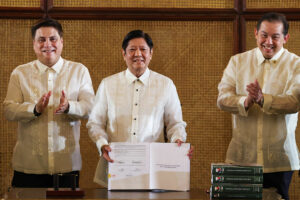




January Economic Update: Growth slows, prices rise
 DOWNLOAD
DOWNLOAD

Inflation Update: Up, up, and away?
 DOWNLOAD
DOWNLOAD

Quarterly Economic Growth Release: Growth takes on a slower pace
 DOWNLOAD
DOWNLOAD


Marcos inks PHP5.77T national budget

President Ferdinand R. Marcos, Jr. on Wednesday signed the P5.768-trillion national budget for 2024, as Congress focused on developing sectors such as education and national defense, among others.
“This budget is more than a spreadsheet of amounts or a ledger of projects,” he said during the signing of Republic Act No. 11975 at Malacañang.
“Rather, it details our battle plan in fighting poverty and combating illiteracy, in producing food and ending hunger, in protecting our homes, in securing our border, and in funding our livelihoods.”
The President reminded government officials to eliminate and steer clear of red tape that would lead to delays in implementing the budget as intended.
“Implementations, delays, and illegal deviations inflict the same havoc of denying the people of the progress and development that they deserve,” Mr. Marcos said.
He called the spending plan a “social contract” with Filipino taxpayers to ensure the government uses their funds for
Next year’s budget is 9.5% higher than this year’s budget and is equivalent to 21.7% of the country’s gross domestic product.
Earlier this month, Congress reconciled the General Appropriations Act of 2024 and approved about PHP 450 billion in new appropriations.
The education sector in the 2024 budget has the biggest allocation of PHP 924.7 billion, as the Department of Education will receive PHP 758.6 billion.
House Speaker Ferdinand Martin G. Romualdez on Tuesday said Congress has allotted PHP 500 billion worth of financial assistance to at least 12 million poor Filipino families next year.
At least PHP 10 billion has been earmarked to provide farmers with free irrigation, seeds, fertilizer and other agricultural products.
Lawmakers have allocated an additional P25 billion to the Department of Agriculture to raise production and P80 billion for irrigation projects under the National Irrigation Administration.
“Higher budgetary allocations for infrastructure, agriculture, and education are vital to improving the country’s productivity,” China Banking Corp. Chief Economist Domini S. Velasquez said in a Viber message.
“The Philippines has been lagging behind in infrastructure development and this remains crucial in reducing the cost of doing business.”
Ms. Velasquez said the government needs to boost its spending on education after the Philippines’ weak performance in the 2022 Program for International Student Assessment (PISA), a global ranking of student performance in math, reading, and science.
Filipino students ranked 77th out of 81 countries as they performed worse than the global average in these subjects.
Lawmakers had boosted the budgets of the Technical Skills and Development Authority, Department of Education, the Commission on Higher Education, and state universities and colleges were increased by almost P30 billion.
Senator Juan Edgardo M. Angara, who heads the Senate Finance Committee, earlier said the budget includes provisions that ensure active transport infrastructure such as bike lanes, and pedestrian walkways are included in major projects.
The budget will also include an additional P1 billion for the expansion of the Philippine General Hospital in Manila, and a separate P1 billion for the Philippine Cancer Center, while P1.5 billion will be used to develop the National Kidney and Transplant Institute.
Senate Majority Leader Joel J. Villanueva earlier said lawmakers boosted the budget of the Department of Trade and Industry by P686 million to boost domestic production and enhance the quality of Philippine products.
Congress also focused on boosting the budgets of defense agencies to ensure national security amid tensions with China in the South China Sea.
Senate President Juan Miguel F. Zubiri has said PHP 6.17 billion has been added to the budgets of the Department of National Defense and Armed Forces of the Philippines. At the same time, the Philippine Coast Guard saw a PHP 2.8 billion budget hike.
Security Bank Corp. Chief Economist Robert Dan J. Roces said state agencies should ensure transparency and accountability in implementing the funding given to them next year.
“Carefully allocating resources based on pressing needs across sectors like agriculture, manufacturing, and more will be key in improving sentiment and also laying the groundwork for long-term growth,” he said in a Viber message.
Mr. Roces said the government should spend more on modernizing infrastructure and programs that foster innovation.
Lawmakers had granted a request from the National Economic and Development Authority to establish an innovations revolving fund to provide grants for innovation programs and projects.
“In this budget, we have included what we consider to be the means that will boost both the physical and human capital of a nation blessed with talent waiting to be tapped with resources ready to be harnessed,” Mr. Marcos said. — By John Victor D. Ordoñez, Reporter
This article originally appeared on bworldonline.com





 By BusinessWorld
By BusinessWorld